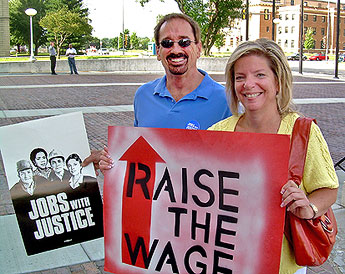
Why Raising the Minimum Wage is Good
|
 |
“Because no one who works full-time in America should have to live in poverty, I will keep making the case that we need to raise a minimum wage that in real terms is lower than it was when Ronald Reagan took office,” he said.
Increasing numbers of lawmakers and worker advocates agree, calling for raising the federal minimum wage, which has remained stuck at $7.25 an hour since 2009.
But many economists say that raising the minimum wage does more than boost low-income workers’ paychecks: it benefits the economy as a whole.
“Setting the minimum wage at an appropriate level can help spur broad-based wage growth and move us toward an economy where workers benefit from productivity growth,” writes Lawrence Mishel, president of the Economic Policy Institute.
Advocates says that raising the minimum wage will give workers more buying power, which will boost consumer spending and help create more jobs all around.
Iowa Sen. Tom Harkin, who recently introduced legislation to raise the minimum wage writes:
According to an analysis conducted by the Economic Policy Institute, raising the minimum wage to $10.10 per hour will increase the gross domestic product by nearly $33 billion over the course of three years as workers spend their raises in their local businesses and communities. This economic activity will generate 140,000 new jobs over the same time period.
The value of the minimum wage has been on the decline for years. In 1968, the minimum wage was $10 per hour in today’s dollars. If it had kept up with productivity growth over the last two decades, it would be $19 per hour.
And that stagnation has left millions of full-time workers living below the poverty level. Many workers employed by low-paying companies like Wal-Mart are dependent on government subsidies like food stamps and Medicaid just to survive.
A recent Congressional study found that one Wal-Mart ends up costing taxpayers as much as $900,000 in federal and state subsidies per year.
And contrary to popular misconceptions, most minimum-wage workers are not teenagers, writes EPI economic David Cooper, who estimates that 88 percent are 20 or older, and 55 percent work full time.
Click here to tell your member of Congress to support the Fair Minimum Wage Act of 2013, which raises the minimum wage to $10.10 an hour.
Photo used under a Creative Commons License from Flickr user uusc4all.
![]()